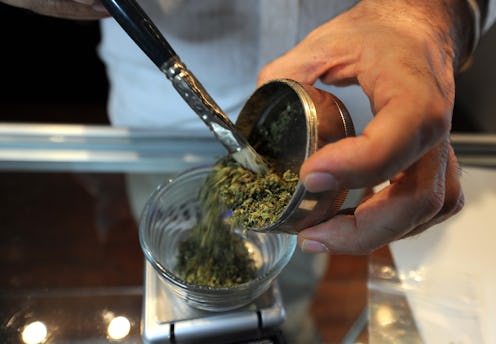News
The Medical Marijuana Election Forecast
Marijuana may be a casual hobby for people like Broad City's Abbi and Ilana, but for many others, it can also be a life-changing approach to medical treatment for issues like chronic pain. More Americans support legalizing it for medical and recreational uses than ever before, with a whopping 89 percent approving of medical marijuana legalization, according to a Quinnipiac University poll. This November many states will vote on the legalization of medicinal marijuana, which could have an enormous impact on how many diseases are treated.
According to Business Insider, the medical uses of marijuana are varied and numerous: it can be used to treat glaucoma, seizure disorders, cancer, anxiety, and Alzheimer's Disease, among other illnesses. (The article also warns that overuse or abuse of marijuana can cause memory problems or dependence.)
Many of the strongest proponents of medical marijuana have experienced it firsthand. Nurse Jeanette Bokland described her experience using medical marijuana to help her cope with cancer treatment in the Huffington Post:
Marijuana took away my nausea, so I could eat healthy. It took away the severe restlessness and anxiety, so I could relax. It allowed me to eat, sleep and be up and active when I was awake — all of which are critical to recovery. It didn’t get me “high;” it made me feel halfway normal (as opposed to the prescriptions, which left me feeling drugged and weak).
This fall, Arkansas, Florida, Montana, and North Dakota will consider legalizing the medicinal use of marijuana, though other states are also considering legalizing pot for recreational use.
In Florida, the state already has some provisional allowances for medical pot, but the current ballot measure is a constitutional amendment that would close key loopholes, according to the editorial board of the Miami Herald, which endorsed the amendment earlier this month. Attitudes about legalized medical marijuana in the Sunshine State have changed significantly in recent years, according to Scott Maxwell of the Sun-Sentinel, who predicts that the amendment will pass.
Presidential candidates Donald Trump and Hillary Clinton both appear to be catching up with these shifts in public opinion. Clinton has said she supports reclassifying marijuana at the federal level so as to permit further study and possible medical use, and Trump has said at rallies that he supports medical marijuana but would leave the issue up to the states.
Financial website The Motley Fool suggests that the fates of the medical marijuana ballot initiatives in Arkansas, Montana, and North Dakota are less predictable. In the longer term, though, the fact that this issue is on the ballot at all may indicate big changes in the way American doctors treat their patients for years to come.
